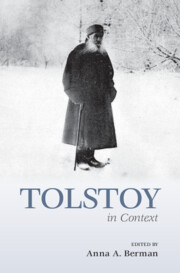Book contents
- Tolstoy in Context
- Tolstoy in Context
- Copyright page
- Contents
- Figures
- Notes on Contributors
- Preface
- Acknowledgments
- Note on Citations, Translations, and Transliterations
- Chronology
- Part I The Man
- Part II Russian Social and Political Contexts
- Part III Literature, the Arts, and Intellectual Life
- Chapter 16 Tolstoy’s Oeuvre
- Chapter 17 Peasant Schools and Education
- Chapter 18 Russian Philosophy
- Chapter 19 The Russian Literary Scene
- Chapter 20 European Literature
- Chapter 21 European Philosophy
- Chapter 22 Theater
- Chapter 23 Music
- Chapter 24 The Visual Arts
- Part IV Science and Technology
- Part V Beyond Russia
- Part VI Tolstoy’s Afterlife
- Suggested Further Reading
- Index
Chapter 23 - Music
from Part III - Literature, the Arts, and Intellectual Life
Published online by Cambridge University Press: 05 January 2023
- Tolstoy in Context
- Tolstoy in Context
- Copyright page
- Contents
- Figures
- Notes on Contributors
- Preface
- Acknowledgments
- Note on Citations, Translations, and Transliterations
- Chronology
- Part I The Man
- Part II Russian Social and Political Contexts
- Part III Literature, the Arts, and Intellectual Life
- Chapter 16 Tolstoy’s Oeuvre
- Chapter 17 Peasant Schools and Education
- Chapter 18 Russian Philosophy
- Chapter 19 The Russian Literary Scene
- Chapter 20 European Literature
- Chapter 21 European Philosophy
- Chapter 22 Theater
- Chapter 23 Music
- Chapter 24 The Visual Arts
- Part IV Science and Technology
- Part V Beyond Russia
- Part VI Tolstoy’s Afterlife
- Suggested Further Reading
- Index
Summary
Tolstoy’s meetings with Russian composers tended to be debacles, for reasons that are easy enough to imagine. The author, after all, was not given to tempering his remarks on topics likely to vex his interlocutors – and for contemporary composers such as Tchaikovsky, Musorgsky, and Rimsky-Korsakov, Tolstoy’s views on art, its purposes, and its ethical responsibilities were decidedly among those vexing topics. Indeed, Tolstoy imagined that music above all the arts posed a special moral-aesthetic danger, as Caryl Emerson, Stephen Halliwell, and others have explained. But whatever their misgivings about Tolstoy the man, composers’ regard for Tolstoy the artist was much less equivocal. Tchaikovsky saw in Tolstoy an eminently “musical” writer whose gifts of simplicity, social observation, and psychological sensitivity were highly sympathetic to his own. Musorgsky, meanwhile, imbued his operas Boris Godunov and Khovanshchina with a vision of history that largely harmonized with the historical philosophy Tolstoy expounded in War and Peace. This chapter explores the connections between Tolstoy’s fiction and contemporaneous Russian music. I focus, in particular, on opera: an art form Tolstoy loathed, but which – as composed by Tchaikovsky, Musorgsky, and other Russians of the era – nonetheless abounded in Tolstoyan resonances.
- Type
- Chapter
- Information
- Tolstoy in Context , pp. 187 - 193Publisher: Cambridge University PressPrint publication year: 2022

